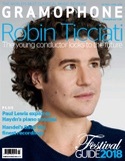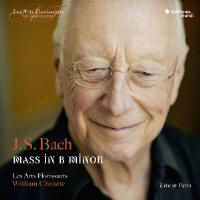Texte paru dans: / Appeared in: |
|
|
Outil de traduction (Très approximatif) |
|
|
Reviewer:
Jonathan Freeman‑Attwood The sophisticated landscape of Les Arts Florissants is drawn expressly from Christie’s ‘affirmation of humanism’, as he puts it, and therefore the elegant, abstract lines heard from the outset of the Kyrie – supported by a gently sprung tactus – are of far greater interest to him than an intensity born of the Germanspeaking rhetorical gesture of the cantata world, a bitingly graphic ‘Crucifixus’ aside. The phraseology of the second ‘Kyrie’ is a case in point, as are the sumptuous textures of the ‘Et incarnatus’, where the courtly French motet lurks ceremoniously in the wings. These are the movements in which you sense Christie truly at the helm. For all the technical prowess with which he dispatches each of the great choruses, from the ‘Cum Sancto’ onwards, Christie seems less creatively attentive – pressing the start button and just leaving them to unfold. For this reason, the ‘Et resurrexit’, and the litany of subsequent D major choruses appear curiously generic, uniformly fast and under-inflected. The ‘Et in terra pax’ is not as shiningly expectant as, say, in the recording of his protégé Jonathan Cohen (Hyperion, 11/14), and like the ‘Qui tollis’ appears to stew in its juices rather than draw the listener towards a directional gravity of enhanced supplication. The solos and duets are generally more engaging, with some notable singing and obbligato playing, and none more than Timothy Mead’s alluring ‘Qui sedes’ or a cultivated ‘Quoniam’ with the vibrant André Morsch, accompanied by Anneke Scott’s brilliantly and highly distinctive horn-playing, and a sensitively shaped ‘Incarnatus’ with Reinoud Van Mechelen. Mead and Katherine Watson are gloriously compatible in ‘Et in unum’, though I wish the care taken here had been applied to Watson’s earlier duet (‘Dominus Deus’), where she is allowed to sit repeatedly under the note. Lapses in intonation are indeed surprisingly frequent and production values a touch disappointing: it wouldn’t take much, for example, to correct the wrong bass note at 2'26" in the ‘Et in terra pax’ or a missed trumpet note in the ‘Cum Sancto’ at 1'00". There is a sense that, for all Christie’s crowning achievements in the worlds of Italian and French music especially, Bach is somehow not quite his bag – despite moments of intermittent illumination. |
|




